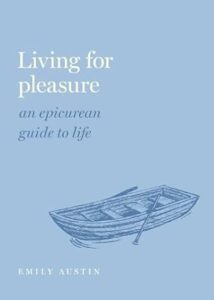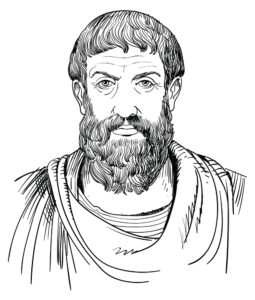The Good Life Is the One Where Anxiety Falls by the Wayside
By James Broughel


- Book Review of Living for Pleasure: An Epicurean Guide to Life, by Emily A. Austin.1
The name Epicurus is often associated with indulgent hedonism. This stereotypical mischaracterization, which has found its way into pop culture and even into supermarket names, suggests a life of excess is the route to happiness. However, a new book by philosopher Emily A. Austin shines a light on the nuanced nature of Epicurus’s belief system, and it turns out the ancient Greek philosopher called for a much more measured approach to pleasure seeking. Furthermore, Epicureanism has a surprising amount to offer those of us caught up in the fast-paced mania of modern life.
In Living for Pleasure: An Epicurean Guide to Life, Austin plunges into the often-misunderstood world of Epicureanism, explaining in enjoyable, easy-to-read prose the intricacies of Epicurus’s hedonism. As for as the man himself, Epicurus’s life was an embodiment of his beliefs. He established a commune known as the Garden, where he propagated his teachings. This was a sanctuary, located just outside the walls of Athens and therefore outside the emotional turbulence of Athenian society. There, he and his followers fostered a life fundamentally dedicated to tranquility (ataraxia) and thoughtful pleasure.
Austin takes great care to highlight how Epicureans distinguish amongst different kinds of human wants and desires. She discusses three types of desires, specifically, which she labels necessary, extravagant, and corrosive. Necessary desires, such as for food and shelter, are indispensable for a comfortable life. Without them, we cannot achieve the tranquility necessary for true happiness. Extravagant desires, though not essential, can enhance our enjoyment. However, we must be careful with them, since too much of a good thing can contribute to anxiety, especially if we do not have a healthy attitude toward indulgence. Corrosive desires, meanwhile, engender anxiety and unhappiness due to their limitless nature. An obsession with amassing wealth and power, for example, is a path to unhappiness, according to the Epicurean belief system. Since there is no natural limit to the amount of these things a person can amass, our desires for them can never be satisfied.
If we apply this way of thinking to contemporary society, it becomes clear that many of us already subconsciously subscribe to a subtle form of Epicureanism. This is the case, for example, when we eschew high-stress careers in order to spend more time with family or to pursue hobbies or other passions. When I finished high school, I pursued a career in music in New York City rather than go to college right away. I knew this might mean lower earnings over my lifetime, but it allowed me to do what I loved and to take a break from the competitive pressures of schooling.
This is not to say Epicureanism is against societal advancement or wealth accumulation. While Epicurus did advocate that one should “live unnoticed,” he himself was an important man about Athens. He would likely say that we should try to make a proactive difference with our lives, but at the same time caution us against being too caught up in day-to-day human affairs. Keep a good head on your shoulders, in other words, and do not develop a chip on your shoulder. This is especially true in the case of the relentless pursuit for limitless goods, since these distract from the mellifluousness that makes us happy.
In a world obsessed with reputation and political maneuvering, Epicureans also have a healthy skepticism toward elites. They see the pursuit of zero-sum status and politics as paths to anxiety, and mostly steer clear of the unhealthy people and activities associated with these power struggles. Austin points out how Epicurus would probably be horrified by the state of modern social media, and she herself has chosen to close her social media accounts, despite the inconveniences this creates for her.
Epicureans are also modestly skeptical of intellect. Intelligence, according to Austin, is a “conditional good,” not being good or bad in itself but rather something that can be wielded for either purpose. The conditional nature of intelligence is something all too obvious in our society today, where elites routinely use their intelligence, prestige, and insider access to knowledge as cudgels to beat down their opponents.
Epicureans emphasize friendship as a core value in pursuit of the good life, with trustworthiness and reciprocity in particular being foundational to forming strong friendships. The best moments in life are those we spend creating pleasant memories in the company of those dearest to us. These moments enable us to maintain tranquility during other, more painful times, as well. Indeed, recalling fond memories with friends is apparently how Epicurus himself dealt with a painful bout of kidney stones at the end of life.

One intriguing aspect of Epicurus’s philosophy is his views on science. With almost prophetic (albeit severely limited) understanding, Epicurus perceived atoms centuries before science could prove their existence. He envisioned a world governed by physical laws and believed that our experience in reality is rooted in sensory perception of objective phenomena, thereby providing a scientific basis for his hedonistic philosophy, which emphasizes pleasure and pain as the core values.
Although Epicurean philosophy might be called “materialistic” for this reason, terms that are more appropriate might be “scientific” or “empirical.” It is a philosophy ultimately grounded in what can be demonstrated as real, as opposed to dogma or ideology—which are more fundamental to the rival Stoic worldview. Death, to Epicurus, is pure annihilation, because it means the end of sense perception. Being a state of non-existence, death is also something not to be feared. This did not exclude spirituality for Epicurus. He believed in deities, but he held that they did not meddle in human affairs.
One aspect of Austin’s book that warrants criticism is she occasionally veers into the territory of contemporary politics, airing grievances about, for example, conservative responses to the COVID-19 pandemic. These digressions feel out of place in an otherwise tightly focused philosophical exploration, and they risk dating the book in the future. It is easy to see how a reader five or ten years from now might find these political interjections petty and irrelevant, distracting from the timeless nature of Epicurean philosophy.
Nevertheless, this critique is relatively minor in comparison to the contribution that Austin’s book made to this reader’s understanding of Epicurean thought. Living for Pleasure is not just a book about philosophy, but, as the subtitle suggests, it is also a guide for how to live a fulfilling life rooted in tranquility. Austin is careful to note she is a philosopher, not a therapist, but it is hard not to see her book as having something of a “self-help” character.
To be clear, this is meant as a compliment and not a criticism. Not only does Austin’s book serve as a tool to educate the reader about history and philosophy, but it offers practical advice for living as well. That Epicurean ideas still resonate in a 21st-century context is a testament to why the school of thought remains one of the most studied in ancient Greek philosophy (alongside Stoicism and Scepticism).
Epicurus reminds us that the pursuit of happiness is not found chasing unlimited wants, but rather by fostering peace of mind. The good life involves focusing on pleasure tied to necessary desires. With the right attitude, we can enjoy some extravagance too. However, this should be kept within limits, as an unhealthy attitude toward excess can easily turn corrosive. Corrosive desires, meanwhile, must be kept in check.
For more on these topics, see
 Kieran Setiya on Midlife. EconTalk.
Kieran Setiya on Midlife. EconTalk. Daniel Haybron on Happiness. EconTalk.
Daniel Haybron on Happiness. EconTalk.- “Kurt Vonnegut and The Idle Rich,” by Nikolai Wenzel. #ReadWithMe Series, Econlib, Aug. 13, 2020.
Above all, Epicurus reminds us that the key to finding tranquility is through healthy, trusting friendships, through doing those things that make us happy, and by avoiding the things that make us anxious. Living for Pleasure is a must-read for anyone seeking guidance on how to maintain such a healthy, balanced lifestyle. It makes a persuasive case to why Epicurus should be given more attention in the pantheon of great thinkers. The book stands out as one of the best of the year; it offers timeliness advice to anyone searching for the path toward a more content and serene life.
* James Broughel is a Senior Fellow at the Competitive Enterprise Institute and a senior editor with the Center for Growth and Opportunity at Utah State University.
